http://www.xinhuanet.com/politics/2019-02/16/c_1124123712.htm
咸咸的味 咸咸的泪——新华社记者冬日夜宿千里岩
2019-02-16 15:46:23 来源: 新华网
关注新华网
微信
微博
Qzone
新华社记者张旭东
千里岩,黄海中部一座无居民、无淡水孤岛,这里曾有一道特色“小吃”——“玻璃汤”,即开水撒盐,是岛上断粮绝境的充饥食品。咸咸的盐水混着悄悄流进嘴角的泪水,藏在千里岩海洋环境监测站老一辈监测员饥饿回忆的最深处。
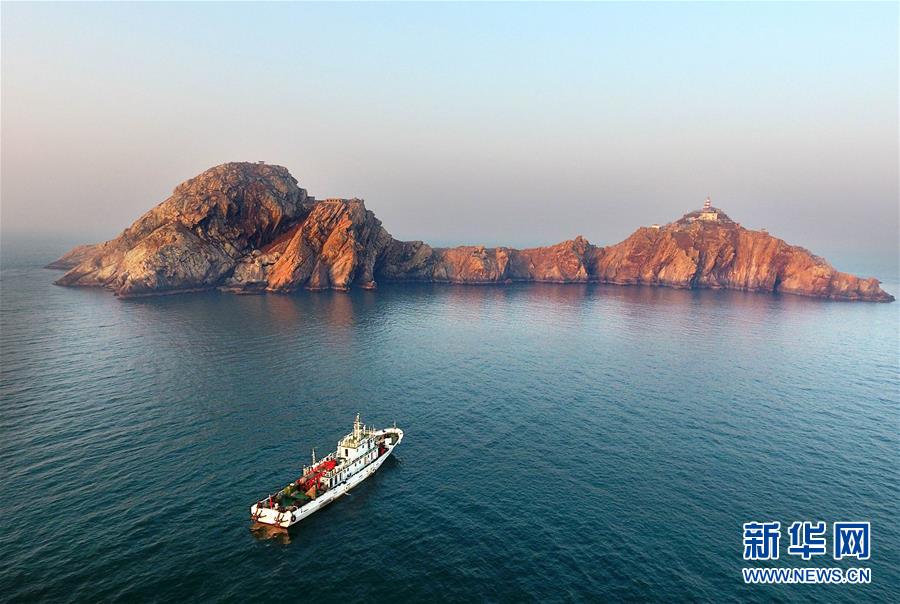
这是1月18日拍摄的千里岩(无人机拍摄)。 新华社记者 李紫恒 摄“玻璃汤”派上用场的次数并不多,但从千里岩海洋环境监测站1960年建站至今,断粮断菜却是几代监测员的日常。春节前夕,新华社记者夜宿千里岩,听监测员讲述戍守孤岛的故事。
“玻璃汤”是最深处的饥饿回忆
记者近日与千里岩海洋环境监测站副站长车豪杰、监测员薛海波,搭乘“向阳红07”船赶赴千里岩。他们俩将轮换在岛上值守了50天的站长姜文凯和监测员郭栋,第一次上岛值班的小伙儿蒋涛主动要求再值守一个月。
船舶航行5小时后,距青岛约55海里的千里岩映入眼帘。薄雾笼罩中的它,犹如一座巨型驼峰矗立在海上,南北两座山上光秃秃的看不到一棵树。姜文凯、郭栋和蒋涛在码头等候,脸上洋溢着喜悦。
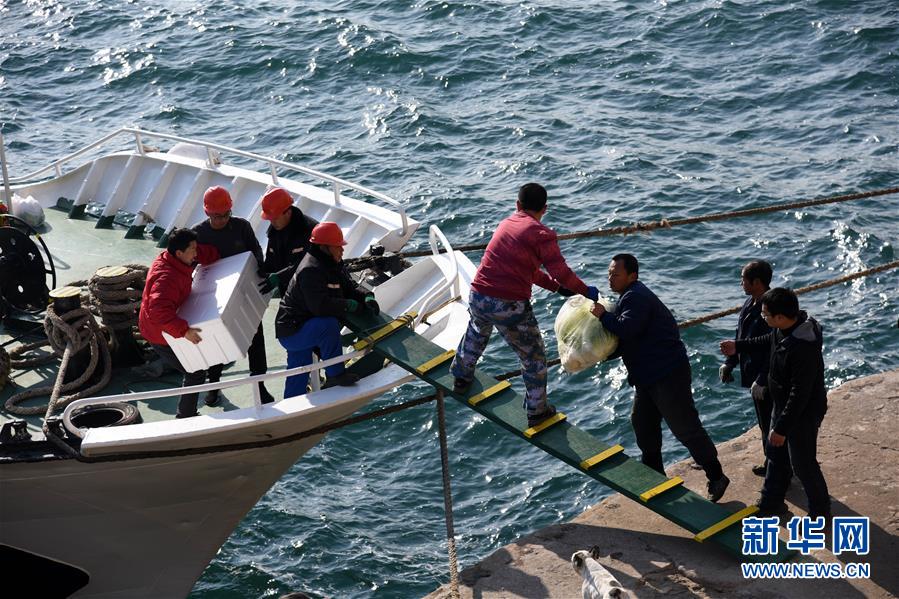
千里岩海洋环境监测站工作人员在搬运补给物资(1月17日摄)。 新华社记者 李紫恒 摄千里岩没有标准码头,只有一小块相对平整的平台,补给船不能正常侧位靠泊,只能将船头或船尾小心翼翼地靠过去。船与码头相连的“舷梯”就是一块木板,随船舶忽高忽低,木板下涌浪飞溅。记者见此不禁有些腿软,狼狈地爬了过去,心有余悸。
姜文凯则一直站在这块剧烈晃动的木板上,将米面、蔬菜、肉、文件柜、灭火器等上百件补给物品一一从船上往岛上递,无视脚下的一切。
“你们害怕这块木板,我们却特别期待。”姜文凯说,“有了它才能有补给,我们才能回家!有时船好不容易来了,但风浪太大靠不上又走了,那才叫无奈。”
千里岩无居民、无淡水、无土壤,一滴淡水、一颗米粒都要靠船舶补给。遇到大风大浪,补给船来不了,千里岩海洋环境监测站就面临最基本的生存问题——没啥吃,不得已三顿饭变两顿饭、一顿饭,甚至无米下炊。
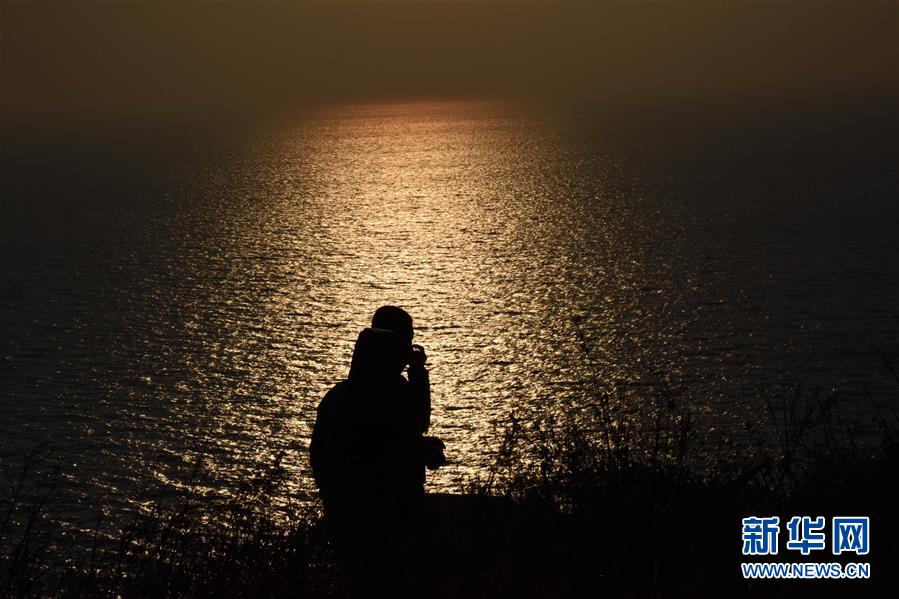
千里岩海洋环境监测站工作人员去山顶巡视测量温度湿度的百叶箱和测风塔(1月17日摄)。新华社记者 李紫恒 摄千里岩之行前,记者采访了已退休的监测站老站长张世江,他在千里岩工作了整整40年,他说:“有时六七十天船来不了,我们就没有吃的了,只能捞海草拌拌吃。实在没啥吃就在水里放点盐喝,我们叫‘玻璃汤’,最后盐都没了。”
自1997年起就在千里岩工作的姜文凯说,一次补给船迟迟不来,他们把馊了的面疙瘩砸碎,用纱窗网筛了一遍吃。“虽然不好吃,总比饿肚子强。”
郭栋印象最深的一次断粮是春天去山上挖野菜,连续吃了十多天水煮野菜。
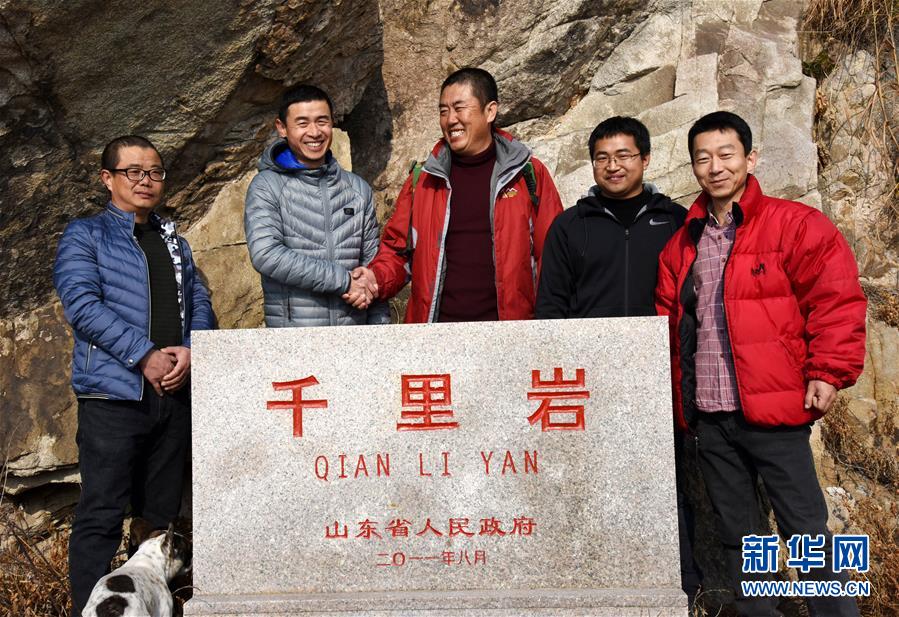
千里岩海洋环境监测站五名同事在拍摄全家福(1月18日摄)。新华社记者 李紫恒 摄冯立达是2016年加入千里岩团队的“90后”,从未经历过缺衣少吃的他,在岛上过了一段苦日子。“当时吃得只剩喂鸡的苞米面,我们就烙苞米面饼子,熬苞米面糊糊。”
断粮偶尔发生,断菜则几乎每月都会遇到。近几年岛上有了蔬菜大棚,但从陆地运来的土在海岛快速盐碱化,蔬菜生长情况不尽如人意。“冬天还好,夏天温度高,菜放不住,刚上岛的前10天有青菜,后面就只剩土豆之类。只有土豆时,负责做饭的人也尽量做出花样,这顿炒土豆丝,下顿炖土豆条。”车豪杰说。
千里岩生活迈入“新时代”
监测站在接近山顶的位置,中间是弯弯曲曲的小路,由300多个陡峭台阶组成。所有补给都要从码头一点点靠人背上去,每次至少背三四个小时。
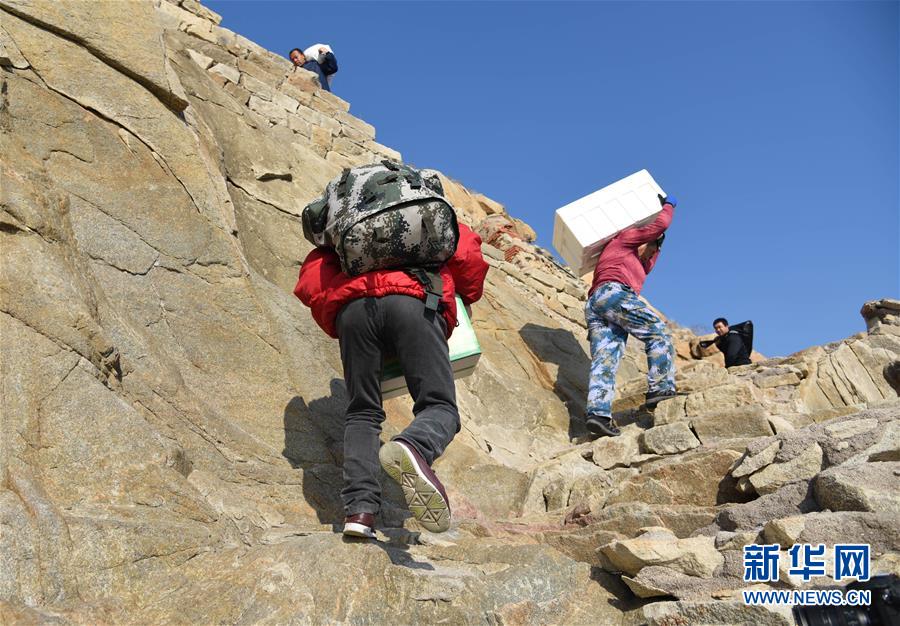
千里岩海洋环境监测站工作人员在运送补给物资(1月17日摄)。新华社记者 李紫恒 摄记者提着一小袋米和无人机,也赶不上姜文凯扛着一袋面粉、拎着一桶花生油的步伐。数九寒天,海风凛冽,姜文凯却大汗淋漓,只穿一件毛衣,他说:“过去冬天烧煤取暖,五六吨煤都靠人背上去,蔬菜大棚的土也是我们一点点背上去,早都习惯了!”
终于来到监测站,不大的小院里一座二层小楼,小狗聪聪朝记者汪汪地叫。搬完补给,夜幕已降临,薛海波压了面条,做了西红柿鸡蛋卤,大家就着蒜瓣吃了起来。
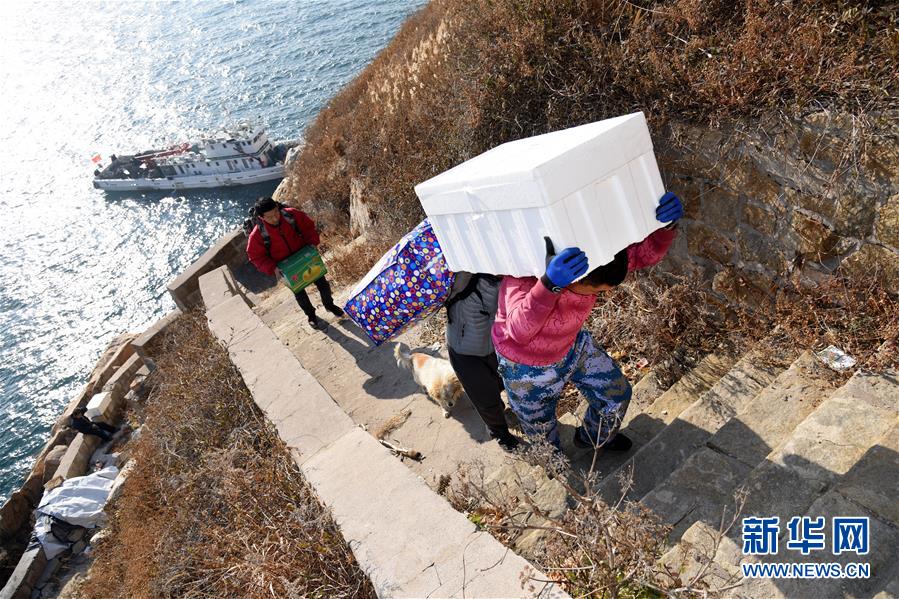
千里岩海洋环境监测站工作人员在运送补给物资(1月17日摄)。新华社记者 李紫恒 摄五个人与记者团坐,打开了话匣子:千里岩每年有100多天大雾,最难熬的是夏天,高温高湿,有时连续一个月大雾,能拧出水的被褥没法晒。米面带再多也没用,时间一长就发霉长毛。著名的千里岩“三多”:苍蝇、蚊子和小咬,更让他们头疼。
“千里岩苍蝇都咬人,而且特别多,打一次药能扫半簸箕。”车豪杰说,“更可怕的是小咬,蚊帐隔不住。有些同事皮肤过敏,第二年才消肿。不过挨几年,咬多了就不怕了,可能有抗体了。”
三伏酷暑,蝇蚊在外,门窗万不能开,他们就往地上泼凉水,席地而睡。“有时冷冻一些瓶装水放在身边降温,其实没多大用,心里边能凉快一点。”姜文凯说。
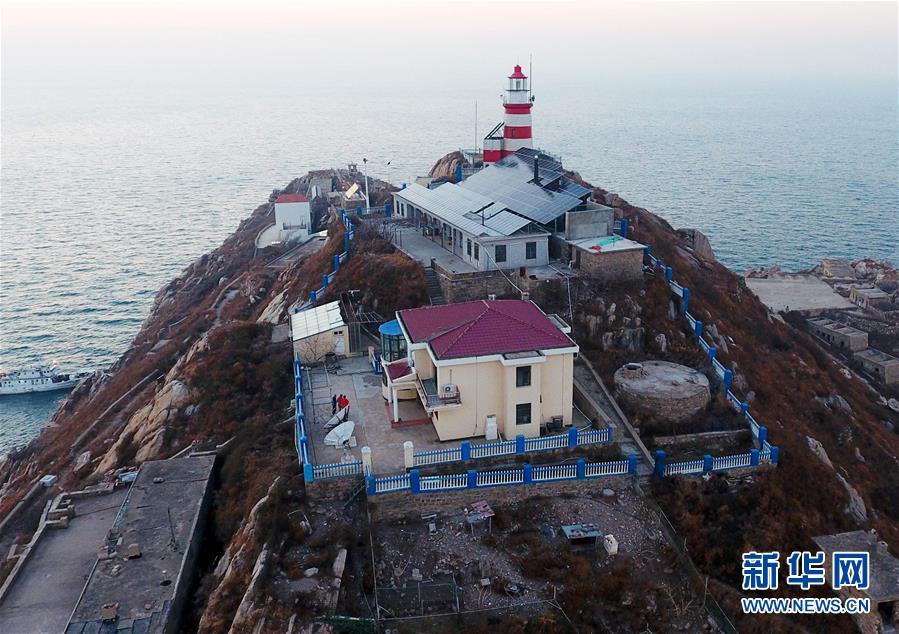
这是1月17日拍摄的千里岩海洋环境监测站(无人机拍摄)。新华社记者 李紫恒 摄不过,对千里岩人来说,现在的守岛生活,虽然和陆地生活相比还是很艰苦,但与建站之初相比,已改善了太多。
以发电为例,很长一段时间站上没电,晚上点煤油灯。而今,从柴油发电机到10千瓦光伏发电设备再到20千瓦,除了阴天下雨,站上所有用电需求基本都能满足,特别是夏天还可以使用空调,这成了千里岩人酷暑生活的最大福祉。
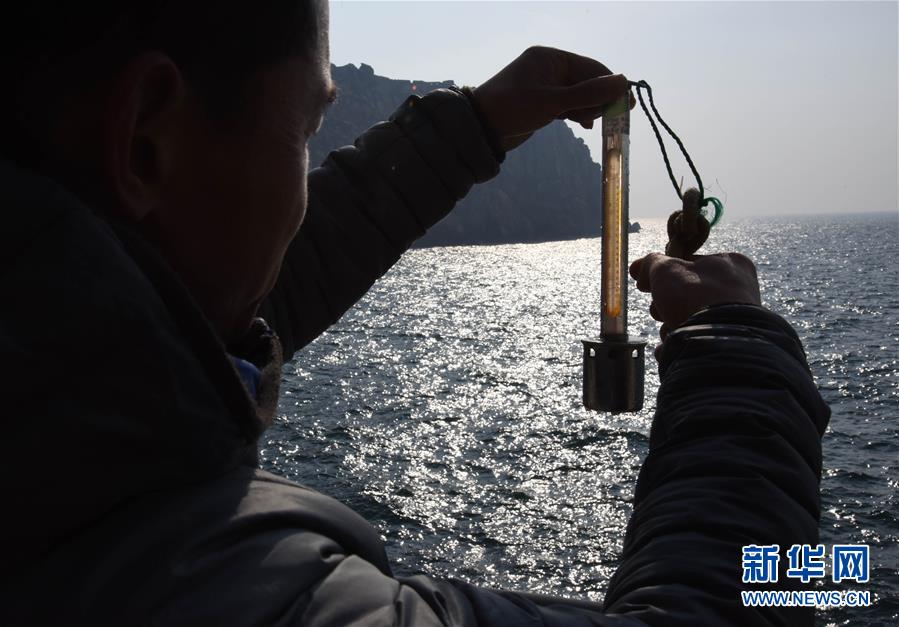
千里岩海洋环境监测站副站长车豪杰在测量海水水温(1月18日摄)。新华社记者 李紫恒 摄薛海波告诉记者,监测站是2007年搬进这座二层小楼的,一楼办公,二楼住人。此前,监测站是平房,由于夏天太潮湿,地上都长青苔。“以前我们喝雨水,因为候鸟迁徙经过千里岩,鸟粪经常落在蓄水池,我们常闹肚子。现在都是从船上补给淡水,还有了净水设备。”
与艰苦的生活条件相比,更为难耐的是寂寞。
监测站最早隔半年甚至一年才轮换人员,现在每月轮换,常因船期而延长至四五十天。特殊的工作环境,让监测站面临招人难的问题。目前站上只有8人,每班3人,每人每年要在1平方公里的孤岛值守六七个月,与他们相伴的只有维护灯塔的2人。
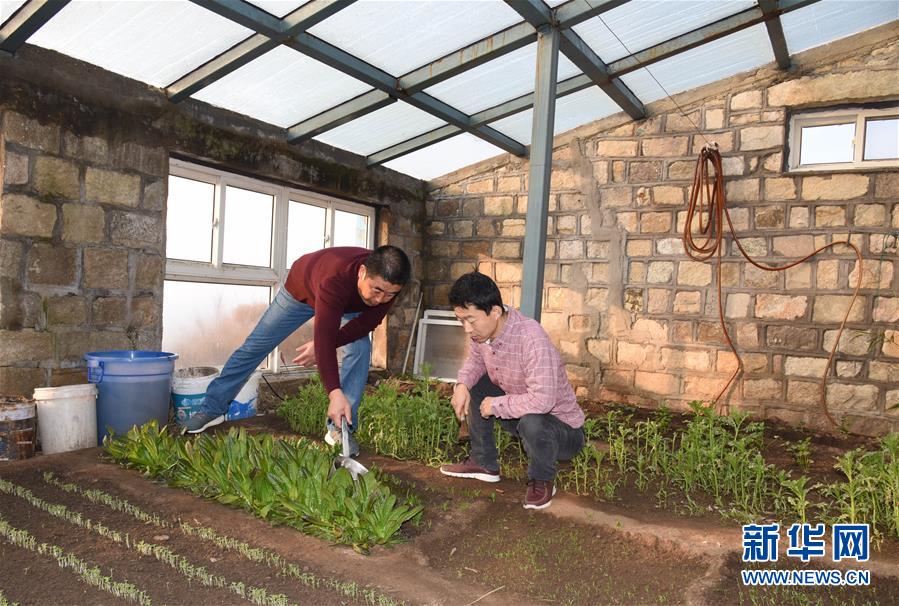
千里岩海洋环境监测站站长姜文凯(左)和监测员薛海波在给蔬菜浇水(1月18日摄)。新华社记者 李紫恒 摄千里岩没有手机信号,近几年天气好时有微弱信号,信号最强的地方在楼梯窗户处,值班手机就放在这里。
作为一名“90后”,冯立达对岛上的寂寞有深刻体会。“以前手机几乎是粘在手上,但上岛有时三四天没信号,更别说刷微信了。”冯立达说,“只有3个人值班,感觉能聊的都聊了好几遍。白天人看人,晚上看星星。”
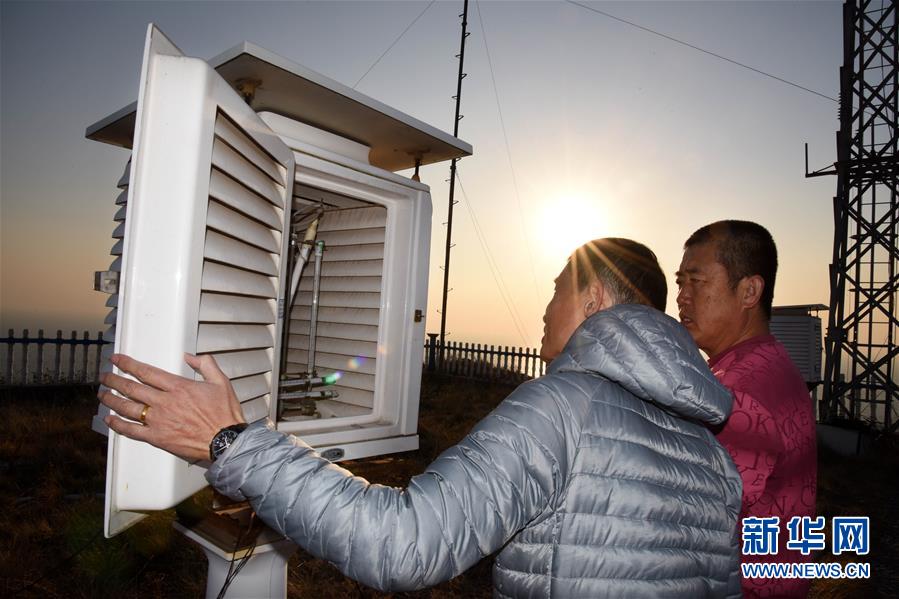
千里岩海洋环境监测站站长姜文凯(右)和副站长车豪杰在交接工作(1月17日摄)。新华社记者 李紫恒 摄上岛第一个月,冯立达在纸上写下“31、30、29……”,每过一天划掉一个。即使有手机信号,冯立达和家人朋友聊天,也尽量不提及工作环境和心情,以免触碰泪腺。
去年,岛上建起了新网络通信设备,千里岩迈入了“e时代”。“现在我们随时可以和家里人视频通话,很大程度上缓解了对家人的思念。”冯立达说。
台风、绿潮来袭,他们是“放哨人”
自然资源部北海分局所属的千里岩海洋环境监测站是我国特类艰苦海洋台站,3名监测员轮流值气象白班-大夜班、小夜班和水文班,整点发送潮汐、温度、湿度、风速、风向、海水盐度等海洋与气象相关的17种数据资料。
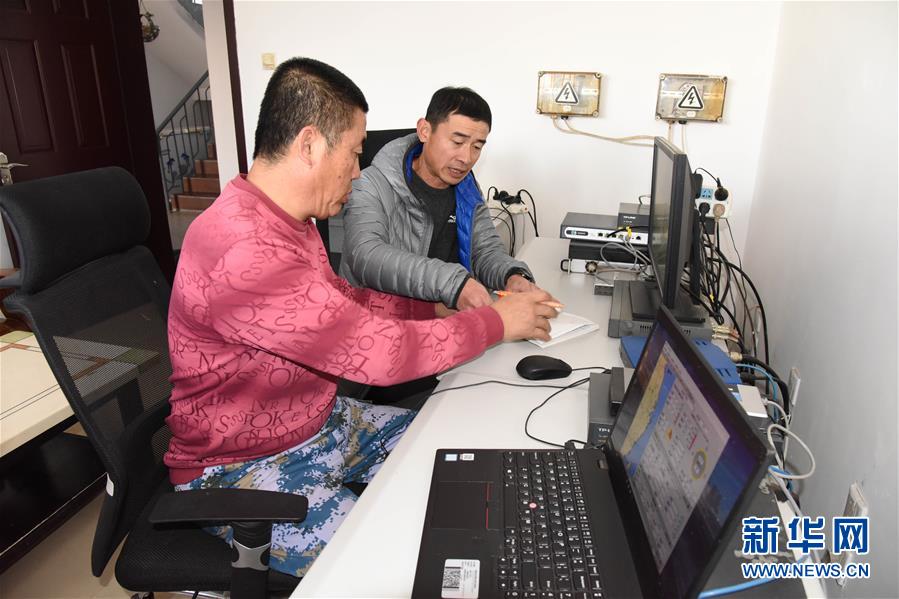
千里岩海洋环境监测站站长姜文凯(左)和副站长车豪杰在交接工作(1月17日摄)。新华社记者 李紫恒 摄自然资源部北海分局所属北海预报中心副主任胡伟说,千里岩海洋环境监测站是黄海距离陆地最远的海洋监测台站,周边环境受人为因素干扰小,观测资料代表性强,监测站每日发送的数据是北海区海洋预报的重要参考资料。
“这里还是海洋防灾减灾的前沿哨所。”胡伟说,“北上影响黄渤海的台风,千里岩会提前观测到第一手资料,为黄渤海沿岸抗台防台提供重要科学依据。同时,千里岩是黄海浒苔绿潮北上的必经之地,监测站会为预测浒苔登陆时间和生物量提供宝贵的现场资料。”
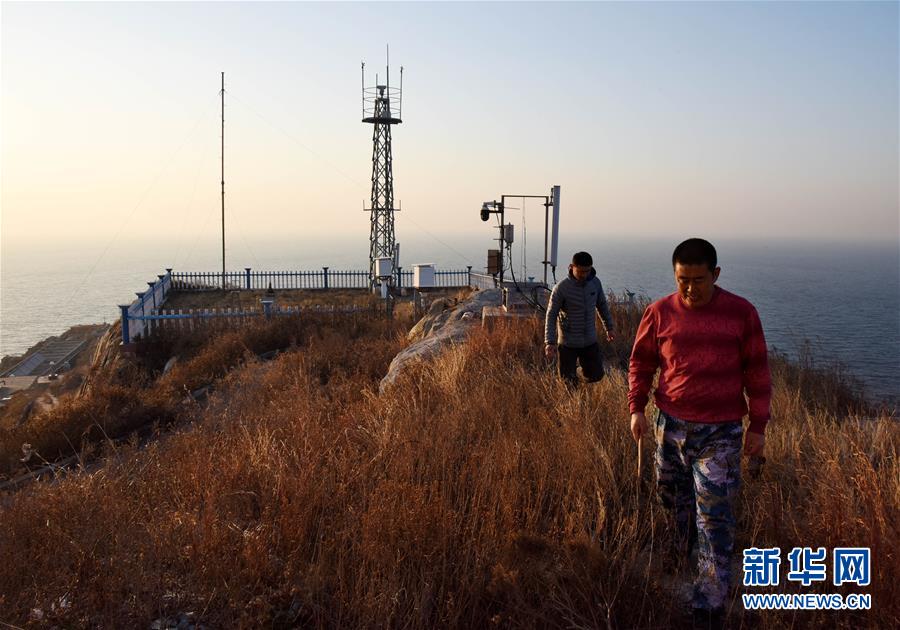
千里岩海洋环境监测站站长姜文凯(前)和副站长车豪杰在交接工作(1月17日摄)。新华社记者 李紫恒 摄坚守千里岩的守岛者就像是“放哨人”,为沿海地区人民时刻监视海洋异动。“地震、海啸都有先兆,海水水温、盐度和潮位均会出现异常。”车豪杰说,“我们观测的数据看似乏味,但关系到亿万同胞的生命和财产安全。”
另外,千里岩海洋环境监测站已积累近60年海洋水文与气象观测资料,对全球海洋与气候研究具有重要参考价值,而且积累的时间越长,研究价值越高。
“过去10多项数据全是人工观测,要自己采样和测量。2000年以来,逐步实现自动化,但每天14点还要去采水样、测盐度,多么恶劣的天气都要去。”郭栋说,“一次吹台风,风速达32米/秒,腿都迈不动,但越是这种天气越是要去测,因为极端天气的数据更重要,更有代表性。”
姜文凯带记者去看了验潮井和盐温井,这是海边两个戴有“红帽子”的小房子,里面摆放了众多的试剂瓶和仪器。“过去,我们每天8点、14点和20点下来测水温,看潮位仪器是否正常,再采集水样回去测量盐度,准时发报。”姜文凯说。
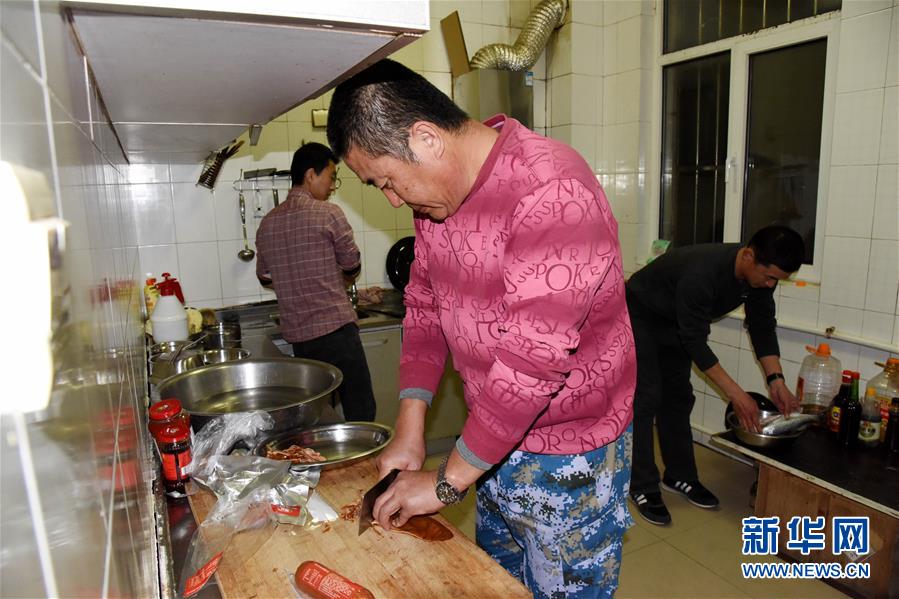
千里岩海洋环境监测站站长姜文凯(前)为留守的同事准备夜宵(1月17日摄)。新华社记者 李紫恒 摄现在监测员仍要定时人工观测,并与自动观测数据对比;定时巡查观测仪器是否运转正常,发现故障立马恢复人工观测。遇到大浪天,他们都用绳子绑着自己在岸边干活,否则一个大浪打上来人就没了。
薛海波说,上岛从来不知道带钱、从来不知道星期几,只知道自己值什么班。其中,气象白班-大夜班是一个人值,气象白班是从7点到17点,大夜班是从次日1点到7点,24小时之内值16个小时的班,工作量非常大。其间,要保证整点气象、水文数据不缺测,海水盐度和“云能天”(云、能见度、天气现象)资料需要人工观测,还要负责做3个人的饭。
千里岩海洋环境监测站长期没有新鲜血液补充,老龄化严重。目前8人中有5人在50岁以上,他们都戍守千里岩20多年。近年来,很多大学生报名并被录用了,但面对戍守孤岛,最终选择了放弃,“90后”冯立达也经历了复杂的心理斗争。
他曾数次想逃离这里,第一次是船刚到千里岩时,第二次是一星期新鲜感过后,第三次是再上岛之前……
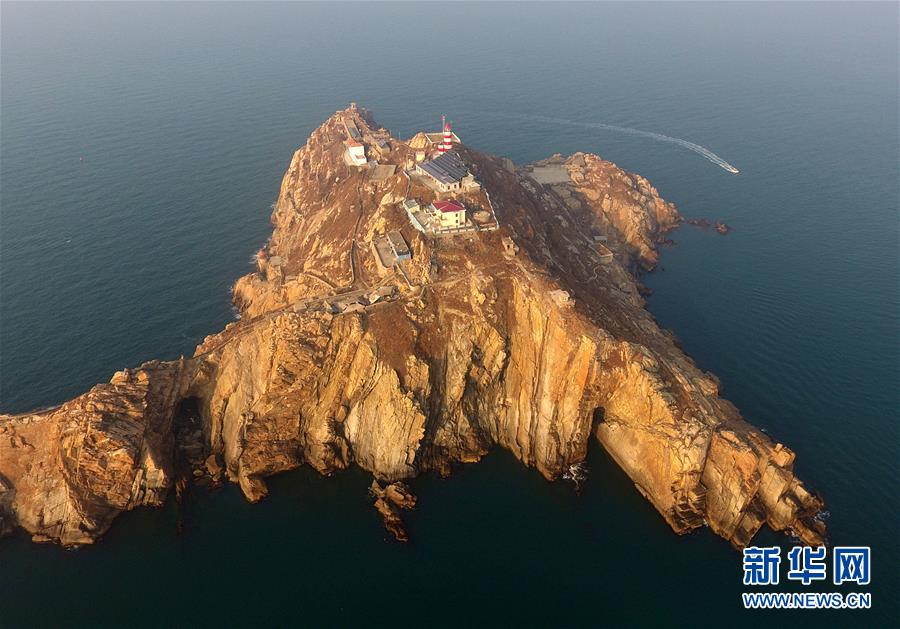
这是1月18日拍摄的千里岩海洋环境监测站(无人机拍摄)。新华社记者 李紫恒 摄“好像有两个小人在心里打架,一个说哪里不能再找份工作?为何要困守孤岛?另一个说坚持下去年轻人,坚持下去才有收获。”冯立达说,“想要逃离的周期越来越长,也逐渐在这找到家的感觉。这里有我们养的鸡、狗、鸽子,还有我们在大棚种的菜。”
只要坚持,心中波澜终归会平静,但他们对家人的亏欠却越积越深。
车豪杰爱人去年6月14日在外出差时脚踝受伤,6月16日返回青岛准备住院手术,而车豪杰当日坐船赶往千里岩换班。“单位领导让同事替换我,再三犹豫,我决定还是上岛,岛上很多事放心不下,留下来心里不安。”他说。
薛海波父亲前年入院进了重症监护室,妻子焦急地打来电话,但困守孤岛的薛海波除了着急,什么忙都帮不上;去年,姜文凯的妻子生病住院,一直到出院才告诉他;郭栋和同事看着唯一电视频道播放的动画片,太想孩子而偷偷抹泪……
车豪杰最近4年在岛上过了3个春节,这个春节他格外心酸。“父母都快80岁了,就希望孩子守在身边,这次上岛明显感觉他们舍不得……”说着,车豪杰哽咽了。
在千里岩人眼里,这里也有属于他们的自豪与快乐。“没有观测就没有预报,很多科学家也用我们的数据。就像金字塔,没有塔基哪来的塔尖。虽然没有论文,没有大奖,但我曾自豪地跟儿子说,爸爸干的是一件对全人类有益的事。”车豪杰说。
Salty and salty, salty tears - Xinhua News Agency reporters stay overnight in Qianliyan
2019-02-16 15:46:23 Source: Xinhuanet
Pay attention to Xinhuanet
WeChat
Weibo
Qzone
Xinhua News Agency, Qingdao, February 16th: The salty taste The salty tears - Xinhua News Agency reporters stay in the winter for thousands of miles
Xinhua News Agency reporter Zhang Xudong
Qianliyan, a non-resident, no freshwater island in the middle of the Yellow Sea. There was once a special "snack" - "glass soup", that is, boiling water and salt, which is a food for the impoverished food on the island. Salty salty water mixed with tears flowing into the corner of the mouth, hidden in the deepest part of the hungry memories of the older generation of monitors at the Qianliyan Marine Environmental Monitoring Station.
(Xinhua all the headlines · graphic interaction) (1) salty taste salty tears - Xinhua News Agency reporters winter nights in Qianliyan
This is the Qianliyan (unmanned aerial vehicle) filmed on January 18. Xinhua News Agency reporter Li Ziheng
The "glass soup" came in handy times, but since the establishment of the Qianliyan Marine Environmental Monitoring Station in 1960, it has been the daily routine of several generations of monitors. On the eve of the Spring Festival, Xinhua News Agency reporters stayed in Qianliyan overnight and listened to the monitors telling the story of the island.
"Glass soup" is the deepest hungry memories
Recently, the reporter and the deputy stationmaster of the Qianliyan Marine Environmental Monitoring Station, Che Haobo, and the monitor Xue Haibo, rushed to Qianliyan on the "Xiangyanghong 07" boat. The two of them will rotate Jiang Wenkai, the stationmaster who has been on the island for 50 days, and the monitor Guo Dong. The first time on the island, Jiang Tao volunteered to wait for another month.
Five hours after the ship sailed, the Qianliyan, about 55 nautical miles from Qingdao, came into view. It is like a giant hump standing on the sea in the mist, and bare trees can not see a tree in the north and south mountains. Jiang Wenkai, Guo Dong and Jiang Tao waited at the pier, and their faces were filled with joy.
(Xinhua all the headlines · graphic interaction) (2) salty taste salty tears - Xinhua News Agency reporters winter nights in Qianliyan
The staff of the Qianliyan Marine Environmental Monitoring Station is carrying supplies (photo taken on January 17). Xinhua News Agency reporter Li Ziheng
There is no standard wharf in Qianliyan. There is only a small piece of relatively flat platform. The supply ship cannot be berthed on the normal side. Only the bow or stern can be carefully leaned over. The "gangway" that connects the ship to the dock is a piece of wood, which rises and falls with the ship, and the waves under the board splash. When the reporter saw this, some of his legs were soft, and he climbed over in the wolf, and he was worried.
Jiang Wenkai has been standing on this swaying wooden board, and has delivered hundreds of supplies such as rice noodles, vegetables, meat, file cabinets and fire extinguishers from the ship to the island, ignoring everything under his feet.
"You are afraid of this piece of wood, but we are particularly looking forward to it." Jiang Wenkai said, "With it, you can have supplies, we can go home! Sometimes the ship is not easy to come, but the wind is too big to rely on and go, then that Calling helpless."
Qianliyan has no residents, no fresh water, no soil, and a drop of fresh water and a rice grain are all supplied by the ship. In the face of strong winds and waves, the supply ship can't come. The Qianliyan Marine Environmental Monitoring Station is facing the most basic survival problem - no food, just three meals, two meals, one meal, or even no rice.
(Xinhua all the headlines · graphic interaction) (5) salty taste salty tears - Xinhua News Agency reporters winter nights in Qianliyan
The staff of the Qianliyan Marine Environmental Monitoring Station went to the top of the mountain to inspect the temperature and humidity of the blinds and the wind tower (photo taken on January 17). Xinhua News Agency reporter Li Ziheng
Before the trip to Qianliyan, the reporter interviewed Zhang Shijiang, the old stationmaster of the retired monitoring station. He worked in Qianliyan for 40 years. He said: "Sometimes the ship will not come in six or seven days, we will not eat it, only You can eat seaweed and mix it. If you don't eat it, put some salt in the water. We call it 'glass soup' and finally the salt is gone."
Jiang Wenkai, who has been working in Qianliyan since 1997, said that a supply ship was not coming. They smashed the smashed noodles and sifted them through the screen nets. “Although it’s not good, it’s better than hungry.”
Guo Dong’s deepest impression was that he went to the mountains to dig wild vegetables in the spring and ate more than ten days of boiled wild vegetables.
(Xinhua all the headlines · graphic interaction) (6) salty taste salty tears - Xinhua News Agency reporters winter nights in Qianliyan
Five colleagues from the Qianliyan Marine Environmental Monitoring Station were photographing the family portrait (photo taken on January 18). Xinhua News Agency reporter Li Ziheng
Feng Lida was the "post-90s" who joined the Qianliyan team in 2016. He has never experienced the lack of clothing and eating. He has had a hard time on the island. "At that time, I only had to eat the glutinous rice noodles that were fed chicken. We ate the rice noodles and glutinous rice noodles."
Occasional food breaks occur occasionally, and broken vegetables are encountered almost every month. In recent years, there have been vegetable greenhouses on the island, but the soil transported from the land has been rapidly salinized on the island, and the growth of vegetables is not satisfactory. "Winter is ok, the summer temperature is high, the vegetables can't be kept. There are vegetables in the first 10 days of the island, and there are only potatoes left behind. When there are only potatoes, the person responsible for cooking also tries to make tricks. Potatoes, the next stewed potato strips." Che Haojie said.
Qianliyan life has entered a "new era"
The monitoring station is located close to the top of the mountain, with a winding path in the middle, consisting of more than 300 steep steps. All supplies must be taken from the dock a little bit by the back of the person, at least three or four hours at a time.
(Xinhua all the headlines · graphic interaction) (3) salty taste salty tears - Xinhua News Agency reporters winter nights in Qianliyan
The staff of the Qianliyan Marine Environmental Monitoring Station is delivering supplies (photo taken on January 17). Xinhua News Agency reporter Li Ziheng
The reporter carried a small bag of rice and drones, and could not keep up with the pace of Jiang Wenkai carrying a bag of flour and holding a bucket of peanut oil. A few cold days, the sea breeze, Jiang Wenkai is sweating, wearing only a sweater, he said: "In the past winter, coal was heated, five or six tons of coal were on the back of the people, the soil of the vegetable greenhouse is also a little bit of us. I used to get used to it!"
Finally came to the monitoring station, a small two-story small building in a small courtyard, the dog Cong Cong called the reporter Wang Wang. After the replenishment, the night has come, Xue Haibo pressed the noodles, made the tomatoes and eggs, and everyone ate the garlic cloves.
(Xinhua all the headlines · graphic interaction) (4) salty taste salty tears - Xinhua News Agency reporters winter nights in Qianliyan
The staff of the Qianliyan Marine Environmental Monitoring Station is delivering supplies (photo taken on January 17). Xinhua News Agency reporter Li Ziheng
Five people sat with the reporters' group and opened the words: Qianliyan has more than 100 days of fog every year. The most difficult thing is summer, high temperature and high humidity, sometimes one month of continuous fog, can be unscrewed by the water. No more use of the rice noodles, it will be mildewed for a long time. The famous Thousand Rocks "Three": flies, mosquitoes and small bites make them more headaches.
"Thousands of miles of flies are biting, and they are especially many. You can sweep a half-time with a single medicine." Che Haojie said, "What is even more terrible is that the small bite, the mosquito net can not be separated. Some colleagues have skin allergies, and the second year will only reduce swelling. However, in a few years, if you bite too much, you will not be afraid. There may be antibodies."
Three volts of hot summer, the fly mosquitoes are outside, the doors and windows can not be opened, they will pour cold water on the ground, sleep on the ground. "Sometimes freezing some bottled water to cool down around, in fact, not much use, my heart can cool a little." Jiang Wenkai said.
(Xinhua all the headlines · graphic interaction) (7) salty taste salty tears - Xinhua News Agency reporters winter nights in Qianliyan
This is the Thousand Rocks Marine Environmental Monitoring Station (unmanned aerial vehicle) taken on January 17. Xinhua News Agency reporter Li Ziheng
However, for Qianliyan people, the current life of the island is still very difficult compared with the life on the land, but it has improved too much compared with the beginning of the station.
Take power generation as an example. For a long time, there was no electricity on the station and a kerosene lamp was lit at night. Nowadays, from diesel generators to 10 kW photovoltaic power generation equipment to 20 kW, in addition to the rainy weather, all the electricity demand on the station can be basically met, especially in the summer, air conditioning can be used, which has become a hot summer life for thousands of miles. The greatest well-being.
(Xinhua all the headlines · graphic interaction) (8) salty taste salty tears - Xinhua News Agency reporters winter nights in Qianliyan
The deputy stationmaster of the Qianliyan Marine Environmental Monitoring Station, Che Haojie, is measuring the sea water temperature (photo taken on January 18). Xinhua News Agency reporter Li Ziheng
Xue Haibo told reporters that the monitoring station was moved into this second-floor small building in 2007. The first floor office and the second floor live. Previously, the monitoring station was a bungalow, and because the summer was too humid, the ground was covered with moss. “We used to drink rain because the migratory birds migrated through the Qianliyan, and the bird droppings often fell in the reservoir. We often have troubles. Now we are replenishing fresh water from the boat and there is water purification equipment.”
Compared with the difficult living conditions, it is loneliness that is even more difficult.
The monitoring station was rotated only half a year or even a year ago. It is now rotated every month and is often extended to forty-five days due to the schedule. The special working environment makes the monitoring station face the problem of recruiting people. At present, there are only 8 people on the station, 3 people in each class. Each person is worth six or seven months on an isolated island of 1 square kilometer. Only two people who maintain the lighthouse are accompanied by them.
(Xinhua all the headlines · graphic interaction) (9) salty taste salty tears - Xinhua News Agency reporters winter nights in Qianliyan
Jiang Wenkai (left), station manager of the Qianliyan Marine Environmental Monitoring Station, and Xue Haibo, a monitor, watered the vegetables (photo taken on January 18). Xinhua News Agency reporter Li Ziheng
There is no cell phone signal in Qianliyan. In recent years, there is a weak signal when the weather is good. The strongest signal is in the stair window, and the mobile phone on duty is placed here.
As a "post-90s", Feng Lida has a deep understanding of the loneliness on the island. "In the past, the mobile phone was almost stuck to the hand, but sometimes there was no signal on the island for three or four days, let alone brushing WeChat." Feng Lida said, "Only three people are on duty, and they can talk about it several times. During the day, people look at it." People, watching the stars at night."
(Xinhua all the headlines · graphic interaction) (10) salty taste salty tears - Xinhua News Agency reporters winter nights in Qianliyan
Jiang Wenkai (right), the director of the Qianliyan Marine Environmental Monitoring Station, and the deputy stationmaster, Che Haojie, were working on the handover (photo taken on January 17). Xinhua News Agency reporter Li Ziheng
On the first month of the island, Feng Lida wrote "31, 30, 29..." on the paper, and crossed out one every day. Even with cell phone signals, Feng Lida chats with family and friends, and tries not to mention the working environment and mood, so as not to touch the lacrimal gland.
Last year, new network communication equipment was built on the island, and Qianliyan entered the “e-era”. "Now we can always have a video call with our family, which greatly eases the family's thoughts." Feng Lida said.
Typhoons and green tides are coming, they are "speakers"
The Qianliyan Marine Environmental Monitoring Station of the Beihai Branch of the Ministry of Natural Resources is a special type of arduous ocean station in China. Three monitors take turns in meteorological white-night shifts, small night shifts and hydrological classes. The whole point sends tides, temperature, humidity and wind speed. 17 kinds of data related to ocean and meteorology such as wind direction and seawater salinity.
(Xinhua all the headlines · graphic interaction) (11) salty taste salty tears - Xinhua News Agency reporters winter nights in Qianliyan
Jiang Wenkai (left), the stationmaster of the Qianliyan Marine Environmental Monitoring Station, and the deputy stationmaster, Che Haojie, were working on the handover (photo taken on January 17). Xinhua News Agency reporter Li Ziheng
Hu Wei, deputy director of the Beihai Forecast Center affiliated to the Beihai Branch of the Ministry of Natural Resources, said that the Qianliyan Marine Environmental Monitoring Station is the ocean monitoring station farthest from the Yellow Sea. The surrounding environment is less interfered by human factors and the observation data is representative. The data sent on the day is an important reference for the North Sea area ocean forecasting.
"This is also the frontier post of marine disaster prevention and mitigation." Hu Wei said, "The typhoon affecting the Yellow Sea and the Bohai Sea in the north, Qianliyan will observe the first-hand information in advance, providing an important scientific basis for the anti-Taiwan defense station along the Yellow Sea and the Bohai Sea. Qianliyan is a must-see for the northwest of the Yellow Sea, and the monitoring station will provide valuable on-site information for predicting the landing time and biomass of the canola."
(Xinhua all the headlines · graphic interaction) (12) salty taste salty tears - Xinhua News Agency reporters winter nights in Qianliyan
Jiang Wenkai (former) and the deputy stationmaster Che Haojie of the Qianliyan Marine Environmental Monitoring Station were working on the handover (photo taken on January 17). Xinhua News Agency reporter Li Ziheng
The island-keepers who adhere to Qianliyan are like "speakers", monitoring the movements of the sea for the people in the coastal areas. "Earthquakes and tsunami have aura, and seawater temperature, salinity and tidal level will be abnormal." Che Haojie said, "The data we observe seems boring, but it is related to the safety of life and property of hundreds of millions of compatriots."
In addition, the Qianliyan Marine Environmental Monitoring Station has accumulated nearly 60 years of marine hydrological and meteorological observation data, which has important reference value for global ocean and climate research, and the longer the accumulation time, the higher the research value.
“The past 10 data are all artificial observations, and they have to be sampled and measured by themselves. Since 2000, automation has been gradually realized, but at 14 o'clock every day, we have to go to collect water samples and measure salinity. What kind of bad weather is going to go.” Dong said, "A typhoon is blown once, the wind speed is up to 32 m / s, and the legs are not moving, but the more the weather is, the more it is going to be tested, because the data of extreme weather is more important and more representative."
Jiang Wenkai took the reporter to see the tide well and the salt temperature well. This is a small house with two "red hats" on the beach, which houses a large number of reagent bottles and instruments. “In the past, we measured the water temperature at 8:00, 14:00 and 20:00 every day to see if the tide level instrument was normal. Then we collected the water sample and went back to measure the salinity and reported it on time.” Jiang Wenkai said.
(Xinhua all the headlines · graphic interaction) (13) salty taste salty tears - Xinhua News Agency reporters winter nights in Qianliyan
Jiang Wenkai (former), director of the Qianliyan Marine Environmental Monitoring Station, prepared a nightingale for his left-behind colleagues (photo taken on January 17). Xinhua News Agency reporter Li Ziheng
Now the monitor still needs to observe the artificial observation regularly and compare it with the automatic observation data; the timing inspection observation instrument is working normally, and the fault is immediately restored to the artificial observation. In the midst of a big wave, they are tied with ropes to work on the shore, otherwise a big wave will be lost.
Xue Haibo said that Shangdao never knew to bring money, never knew the day of the week, only knew what class he was worth. Among them, the Meteorological White-Large Night is a person's value, the weather white shift is from 7:00 to 17:00, the big night shift is from 1 to 7 o'clock the next day, and the 16-hour shift within 24 hours, the workload is very large. In the meantime, it is necessary to ensure that the whole point of meteorological and hydrological data is not lacking. The seawater salinity and the “cloud energy” (cloud, visibility, weather phenomenon) data need manual observation, and it is also responsible for making three people's meals.
The Qianliyan Marine Environmental Monitoring Station has no fresh blood supplement for a long time and is seriously aging. At present, 5 out of 8 people are over 50 years old, and they all adhere to Qianliyan for more than 20 years. In recent years, many college students have signed up and been hired, but in the face of shunning the island, they finally chose to give up. After 90s, Feng Lida also experienced a complicated psychological struggle.
He tried to escape from here several times. The first time was when the ship first arrived in Qianliyan, the second time was after a week of fresh feeling, and the third time was before going to the island...
(Xinhua all the headlines · graphic interaction) (14) salty taste salty tears - Xinhua News Agency reporters winter nights in Qianliyan
This is the Thousand Rocks Marine Environmental Monitoring Station (unmanned aerial vehicle) taken on January 18. Xinhua News Agency reporter Li Ziheng
"It seems that there are two villains fighting in the heart, one can say where can't find again.
咸咸的味 咸咸的泪——新华社记者冬日夜宿千里岩
2019-02-16 15:46:23 来源: 新华网
关注新华网
微信
微博
Qzone
新华社青岛2月16日电 题:咸咸的味 咸咸的泪——新华社记者冬日夜宿千里岩新华社记者张旭东
千里岩,黄海中部一座无居民、无淡水孤岛,这里曾有一道特色“小吃”——“玻璃汤”,即开水撒盐,是岛上断粮绝境的充饥食品。咸咸的盐水混着悄悄流进嘴角的泪水,藏在千里岩海洋环境监测站老一辈监测员饥饿回忆的最深处。

这是1月18日拍摄的千里岩(无人机拍摄)。 新华社记者 李紫恒 摄
“玻璃汤”是最深处的饥饿回忆
记者近日与千里岩海洋环境监测站副站长车豪杰、监测员薛海波,搭乘“向阳红07”船赶赴千里岩。他们俩将轮换在岛上值守了50天的站长姜文凯和监测员郭栋,第一次上岛值班的小伙儿蒋涛主动要求再值守一个月。
船舶航行5小时后,距青岛约55海里的千里岩映入眼帘。薄雾笼罩中的它,犹如一座巨型驼峰矗立在海上,南北两座山上光秃秃的看不到一棵树。姜文凯、郭栋和蒋涛在码头等候,脸上洋溢着喜悦。

千里岩海洋环境监测站工作人员在搬运补给物资(1月17日摄)。 新华社记者 李紫恒 摄
姜文凯则一直站在这块剧烈晃动的木板上,将米面、蔬菜、肉、文件柜、灭火器等上百件补给物品一一从船上往岛上递,无视脚下的一切。
“你们害怕这块木板,我们却特别期待。”姜文凯说,“有了它才能有补给,我们才能回家!有时船好不容易来了,但风浪太大靠不上又走了,那才叫无奈。”
千里岩无居民、无淡水、无土壤,一滴淡水、一颗米粒都要靠船舶补给。遇到大风大浪,补给船来不了,千里岩海洋环境监测站就面临最基本的生存问题——没啥吃,不得已三顿饭变两顿饭、一顿饭,甚至无米下炊。

千里岩海洋环境监测站工作人员去山顶巡视测量温度湿度的百叶箱和测风塔(1月17日摄)。新华社记者 李紫恒 摄
自1997年起就在千里岩工作的姜文凯说,一次补给船迟迟不来,他们把馊了的面疙瘩砸碎,用纱窗网筛了一遍吃。“虽然不好吃,总比饿肚子强。”
郭栋印象最深的一次断粮是春天去山上挖野菜,连续吃了十多天水煮野菜。

千里岩海洋环境监测站五名同事在拍摄全家福(1月18日摄)。新华社记者 李紫恒 摄
断粮偶尔发生,断菜则几乎每月都会遇到。近几年岛上有了蔬菜大棚,但从陆地运来的土在海岛快速盐碱化,蔬菜生长情况不尽如人意。“冬天还好,夏天温度高,菜放不住,刚上岛的前10天有青菜,后面就只剩土豆之类。只有土豆时,负责做饭的人也尽量做出花样,这顿炒土豆丝,下顿炖土豆条。”车豪杰说。
千里岩生活迈入“新时代”
监测站在接近山顶的位置,中间是弯弯曲曲的小路,由300多个陡峭台阶组成。所有补给都要从码头一点点靠人背上去,每次至少背三四个小时。

千里岩海洋环境监测站工作人员在运送补给物资(1月17日摄)。新华社记者 李紫恒 摄
终于来到监测站,不大的小院里一座二层小楼,小狗聪聪朝记者汪汪地叫。搬完补给,夜幕已降临,薛海波压了面条,做了西红柿鸡蛋卤,大家就着蒜瓣吃了起来。

千里岩海洋环境监测站工作人员在运送补给物资(1月17日摄)。新华社记者 李紫恒 摄
“千里岩苍蝇都咬人,而且特别多,打一次药能扫半簸箕。”车豪杰说,“更可怕的是小咬,蚊帐隔不住。有些同事皮肤过敏,第二年才消肿。不过挨几年,咬多了就不怕了,可能有抗体了。”
三伏酷暑,蝇蚊在外,门窗万不能开,他们就往地上泼凉水,席地而睡。“有时冷冻一些瓶装水放在身边降温,其实没多大用,心里边能凉快一点。”姜文凯说。

这是1月17日拍摄的千里岩海洋环境监测站(无人机拍摄)。新华社记者 李紫恒 摄
以发电为例,很长一段时间站上没电,晚上点煤油灯。而今,从柴油发电机到10千瓦光伏发电设备再到20千瓦,除了阴天下雨,站上所有用电需求基本都能满足,特别是夏天还可以使用空调,这成了千里岩人酷暑生活的最大福祉。

千里岩海洋环境监测站副站长车豪杰在测量海水水温(1月18日摄)。新华社记者 李紫恒 摄
与艰苦的生活条件相比,更为难耐的是寂寞。
监测站最早隔半年甚至一年才轮换人员,现在每月轮换,常因船期而延长至四五十天。特殊的工作环境,让监测站面临招人难的问题。目前站上只有8人,每班3人,每人每年要在1平方公里的孤岛值守六七个月,与他们相伴的只有维护灯塔的2人。

千里岩海洋环境监测站站长姜文凯(左)和监测员薛海波在给蔬菜浇水(1月18日摄)。新华社记者 李紫恒 摄
作为一名“90后”,冯立达对岛上的寂寞有深刻体会。“以前手机几乎是粘在手上,但上岛有时三四天没信号,更别说刷微信了。”冯立达说,“只有3个人值班,感觉能聊的都聊了好几遍。白天人看人,晚上看星星。”

千里岩海洋环境监测站站长姜文凯(右)和副站长车豪杰在交接工作(1月17日摄)。新华社记者 李紫恒 摄
去年,岛上建起了新网络通信设备,千里岩迈入了“e时代”。“现在我们随时可以和家里人视频通话,很大程度上缓解了对家人的思念。”冯立达说。
台风、绿潮来袭,他们是“放哨人”
自然资源部北海分局所属的千里岩海洋环境监测站是我国特类艰苦海洋台站,3名监测员轮流值气象白班-大夜班、小夜班和水文班,整点发送潮汐、温度、湿度、风速、风向、海水盐度等海洋与气象相关的17种数据资料。

千里岩海洋环境监测站站长姜文凯(左)和副站长车豪杰在交接工作(1月17日摄)。新华社记者 李紫恒 摄
“这里还是海洋防灾减灾的前沿哨所。”胡伟说,“北上影响黄渤海的台风,千里岩会提前观测到第一手资料,为黄渤海沿岸抗台防台提供重要科学依据。同时,千里岩是黄海浒苔绿潮北上的必经之地,监测站会为预测浒苔登陆时间和生物量提供宝贵的现场资料。”

千里岩海洋环境监测站站长姜文凯(前)和副站长车豪杰在交接工作(1月17日摄)。新华社记者 李紫恒 摄
另外,千里岩海洋环境监测站已积累近60年海洋水文与气象观测资料,对全球海洋与气候研究具有重要参考价值,而且积累的时间越长,研究价值越高。
“过去10多项数据全是人工观测,要自己采样和测量。2000年以来,逐步实现自动化,但每天14点还要去采水样、测盐度,多么恶劣的天气都要去。”郭栋说,“一次吹台风,风速达32米/秒,腿都迈不动,但越是这种天气越是要去测,因为极端天气的数据更重要,更有代表性。”
姜文凯带记者去看了验潮井和盐温井,这是海边两个戴有“红帽子”的小房子,里面摆放了众多的试剂瓶和仪器。“过去,我们每天8点、14点和20点下来测水温,看潮位仪器是否正常,再采集水样回去测量盐度,准时发报。”姜文凯说。

千里岩海洋环境监测站站长姜文凯(前)为留守的同事准备夜宵(1月17日摄)。新华社记者 李紫恒 摄
薛海波说,上岛从来不知道带钱、从来不知道星期几,只知道自己值什么班。其中,气象白班-大夜班是一个人值,气象白班是从7点到17点,大夜班是从次日1点到7点,24小时之内值16个小时的班,工作量非常大。其间,要保证整点气象、水文数据不缺测,海水盐度和“云能天”(云、能见度、天气现象)资料需要人工观测,还要负责做3个人的饭。
千里岩海洋环境监测站长期没有新鲜血液补充,老龄化严重。目前8人中有5人在50岁以上,他们都戍守千里岩20多年。近年来,很多大学生报名并被录用了,但面对戍守孤岛,最终选择了放弃,“90后”冯立达也经历了复杂的心理斗争。
他曾数次想逃离这里,第一次是船刚到千里岩时,第二次是一星期新鲜感过后,第三次是再上岛之前……

这是1月18日拍摄的千里岩海洋环境监测站(无人机拍摄)。新华社记者 李紫恒 摄
只要坚持,心中波澜终归会平静,但他们对家人的亏欠却越积越深。
车豪杰爱人去年6月14日在外出差时脚踝受伤,6月16日返回青岛准备住院手术,而车豪杰当日坐船赶往千里岩换班。“单位领导让同事替换我,再三犹豫,我决定还是上岛,岛上很多事放心不下,留下来心里不安。”他说。
薛海波父亲前年入院进了重症监护室,妻子焦急地打来电话,但困守孤岛的薛海波除了着急,什么忙都帮不上;去年,姜文凯的妻子生病住院,一直到出院才告诉他;郭栋和同事看着唯一电视频道播放的动画片,太想孩子而偷偷抹泪……
车豪杰最近4年在岛上过了3个春节,这个春节他格外心酸。“父母都快80岁了,就希望孩子守在身边,这次上岛明显感觉他们舍不得……”说着,车豪杰哽咽了。
在千里岩人眼里,这里也有属于他们的自豪与快乐。“没有观测就没有预报,很多科学家也用我们的数据。就像金字塔,没有塔基哪来的塔尖。虽然没有论文,没有大奖,但我曾自豪地跟儿子说,爸爸干的是一件对全人类有益的事。”车豪杰说。
Salty and salty, salty tears - Xinhua News Agency reporters stay overnight in Qianliyan
2019-02-16 15:46:23 Source: Xinhuanet
Pay attention to Xinhuanet
Qzone
Xinhua News Agency, Qingdao, February 16th: The salty taste The salty tears - Xinhua News Agency reporters stay in the winter for thousands of miles
Xinhua News Agency reporter Zhang Xudong
Qianliyan, a non-resident, no freshwater island in the middle of the Yellow Sea. There was once a special "snack" - "glass soup", that is, boiling water and salt, which is a food for the impoverished food on the island. Salty salty water mixed with tears flowing into the corner of the mouth, hidden in the deepest part of the hungry memories of the older generation of monitors at the Qianliyan Marine Environmental Monitoring Station.
(Xinhua all the headlines · graphic interaction) (1) salty taste salty tears - Xinhua News Agency reporters winter nights in Qianliyan
This is the Qianliyan (unmanned aerial vehicle) filmed on January 18. Xinhua News Agency reporter Li Ziheng
The "glass soup" came in handy times, but since the establishment of the Qianliyan Marine Environmental Monitoring Station in 1960, it has been the daily routine of several generations of monitors. On the eve of the Spring Festival, Xinhua News Agency reporters stayed in Qianliyan overnight and listened to the monitors telling the story of the island.
"Glass soup" is the deepest hungry memories
Recently, the reporter and the deputy stationmaster of the Qianliyan Marine Environmental Monitoring Station, Che Haobo, and the monitor Xue Haibo, rushed to Qianliyan on the "Xiangyanghong 07" boat. The two of them will rotate Jiang Wenkai, the stationmaster who has been on the island for 50 days, and the monitor Guo Dong. The first time on the island, Jiang Tao volunteered to wait for another month.
Five hours after the ship sailed, the Qianliyan, about 55 nautical miles from Qingdao, came into view. It is like a giant hump standing on the sea in the mist, and bare trees can not see a tree in the north and south mountains. Jiang Wenkai, Guo Dong and Jiang Tao waited at the pier, and their faces were filled with joy.
(Xinhua all the headlines · graphic interaction) (2) salty taste salty tears - Xinhua News Agency reporters winter nights in Qianliyan
The staff of the Qianliyan Marine Environmental Monitoring Station is carrying supplies (photo taken on January 17). Xinhua News Agency reporter Li Ziheng
There is no standard wharf in Qianliyan. There is only a small piece of relatively flat platform. The supply ship cannot be berthed on the normal side. Only the bow or stern can be carefully leaned over. The "gangway" that connects the ship to the dock is a piece of wood, which rises and falls with the ship, and the waves under the board splash. When the reporter saw this, some of his legs were soft, and he climbed over in the wolf, and he was worried.
Jiang Wenkai has been standing on this swaying wooden board, and has delivered hundreds of supplies such as rice noodles, vegetables, meat, file cabinets and fire extinguishers from the ship to the island, ignoring everything under his feet.
"You are afraid of this piece of wood, but we are particularly looking forward to it." Jiang Wenkai said, "With it, you can have supplies, we can go home! Sometimes the ship is not easy to come, but the wind is too big to rely on and go, then that Calling helpless."
Qianliyan has no residents, no fresh water, no soil, and a drop of fresh water and a rice grain are all supplied by the ship. In the face of strong winds and waves, the supply ship can't come. The Qianliyan Marine Environmental Monitoring Station is facing the most basic survival problem - no food, just three meals, two meals, one meal, or even no rice.
(Xinhua all the headlines · graphic interaction) (5) salty taste salty tears - Xinhua News Agency reporters winter nights in Qianliyan
The staff of the Qianliyan Marine Environmental Monitoring Station went to the top of the mountain to inspect the temperature and humidity of the blinds and the wind tower (photo taken on January 17). Xinhua News Agency reporter Li Ziheng
Before the trip to Qianliyan, the reporter interviewed Zhang Shijiang, the old stationmaster of the retired monitoring station. He worked in Qianliyan for 40 years. He said: "Sometimes the ship will not come in six or seven days, we will not eat it, only You can eat seaweed and mix it. If you don't eat it, put some salt in the water. We call it 'glass soup' and finally the salt is gone."
Jiang Wenkai, who has been working in Qianliyan since 1997, said that a supply ship was not coming. They smashed the smashed noodles and sifted them through the screen nets. “Although it’s not good, it’s better than hungry.”
Guo Dong’s deepest impression was that he went to the mountains to dig wild vegetables in the spring and ate more than ten days of boiled wild vegetables.
(Xinhua all the headlines · graphic interaction) (6) salty taste salty tears - Xinhua News Agency reporters winter nights in Qianliyan
Five colleagues from the Qianliyan Marine Environmental Monitoring Station were photographing the family portrait (photo taken on January 18). Xinhua News Agency reporter Li Ziheng
Feng Lida was the "post-90s" who joined the Qianliyan team in 2016. He has never experienced the lack of clothing and eating. He has had a hard time on the island. "At that time, I only had to eat the glutinous rice noodles that were fed chicken. We ate the rice noodles and glutinous rice noodles."
Occasional food breaks occur occasionally, and broken vegetables are encountered almost every month. In recent years, there have been vegetable greenhouses on the island, but the soil transported from the land has been rapidly salinized on the island, and the growth of vegetables is not satisfactory. "Winter is ok, the summer temperature is high, the vegetables can't be kept. There are vegetables in the first 10 days of the island, and there are only potatoes left behind. When there are only potatoes, the person responsible for cooking also tries to make tricks. Potatoes, the next stewed potato strips." Che Haojie said.
Qianliyan life has entered a "new era"
The monitoring station is located close to the top of the mountain, with a winding path in the middle, consisting of more than 300 steep steps. All supplies must be taken from the dock a little bit by the back of the person, at least three or four hours at a time.
(Xinhua all the headlines · graphic interaction) (3) salty taste salty tears - Xinhua News Agency reporters winter nights in Qianliyan
The staff of the Qianliyan Marine Environmental Monitoring Station is delivering supplies (photo taken on January 17). Xinhua News Agency reporter Li Ziheng
The reporter carried a small bag of rice and drones, and could not keep up with the pace of Jiang Wenkai carrying a bag of flour and holding a bucket of peanut oil. A few cold days, the sea breeze, Jiang Wenkai is sweating, wearing only a sweater, he said: "In the past winter, coal was heated, five or six tons of coal were on the back of the people, the soil of the vegetable greenhouse is also a little bit of us. I used to get used to it!"
Finally came to the monitoring station, a small two-story small building in a small courtyard, the dog Cong Cong called the reporter Wang Wang. After the replenishment, the night has come, Xue Haibo pressed the noodles, made the tomatoes and eggs, and everyone ate the garlic cloves.
(Xinhua all the headlines · graphic interaction) (4) salty taste salty tears - Xinhua News Agency reporters winter nights in Qianliyan
The staff of the Qianliyan Marine Environmental Monitoring Station is delivering supplies (photo taken on January 17). Xinhua News Agency reporter Li Ziheng
Five people sat with the reporters' group and opened the words: Qianliyan has more than 100 days of fog every year. The most difficult thing is summer, high temperature and high humidity, sometimes one month of continuous fog, can be unscrewed by the water. No more use of the rice noodles, it will be mildewed for a long time. The famous Thousand Rocks "Three": flies, mosquitoes and small bites make them more headaches.
"Thousands of miles of flies are biting, and they are especially many. You can sweep a half-time with a single medicine." Che Haojie said, "What is even more terrible is that the small bite, the mosquito net can not be separated. Some colleagues have skin allergies, and the second year will only reduce swelling. However, in a few years, if you bite too much, you will not be afraid. There may be antibodies."
Three volts of hot summer, the fly mosquitoes are outside, the doors and windows can not be opened, they will pour cold water on the ground, sleep on the ground. "Sometimes freezing some bottled water to cool down around, in fact, not much use, my heart can cool a little." Jiang Wenkai said.
(Xinhua all the headlines · graphic interaction) (7) salty taste salty tears - Xinhua News Agency reporters winter nights in Qianliyan
This is the Thousand Rocks Marine Environmental Monitoring Station (unmanned aerial vehicle) taken on January 17. Xinhua News Agency reporter Li Ziheng
However, for Qianliyan people, the current life of the island is still very difficult compared with the life on the land, but it has improved too much compared with the beginning of the station.
Take power generation as an example. For a long time, there was no electricity on the station and a kerosene lamp was lit at night. Nowadays, from diesel generators to 10 kW photovoltaic power generation equipment to 20 kW, in addition to the rainy weather, all the electricity demand on the station can be basically met, especially in the summer, air conditioning can be used, which has become a hot summer life for thousands of miles. The greatest well-being.
(Xinhua all the headlines · graphic interaction) (8) salty taste salty tears - Xinhua News Agency reporters winter nights in Qianliyan
The deputy stationmaster of the Qianliyan Marine Environmental Monitoring Station, Che Haojie, is measuring the sea water temperature (photo taken on January 18). Xinhua News Agency reporter Li Ziheng
Xue Haibo told reporters that the monitoring station was moved into this second-floor small building in 2007. The first floor office and the second floor live. Previously, the monitoring station was a bungalow, and because the summer was too humid, the ground was covered with moss. “We used to drink rain because the migratory birds migrated through the Qianliyan, and the bird droppings often fell in the reservoir. We often have troubles. Now we are replenishing fresh water from the boat and there is water purification equipment.”
Compared with the difficult living conditions, it is loneliness that is even more difficult.
The monitoring station was rotated only half a year or even a year ago. It is now rotated every month and is often extended to forty-five days due to the schedule. The special working environment makes the monitoring station face the problem of recruiting people. At present, there are only 8 people on the station, 3 people in each class. Each person is worth six or seven months on an isolated island of 1 square kilometer. Only two people who maintain the lighthouse are accompanied by them.
(Xinhua all the headlines · graphic interaction) (9) salty taste salty tears - Xinhua News Agency reporters winter nights in Qianliyan
Jiang Wenkai (left), station manager of the Qianliyan Marine Environmental Monitoring Station, and Xue Haibo, a monitor, watered the vegetables (photo taken on January 18). Xinhua News Agency reporter Li Ziheng
There is no cell phone signal in Qianliyan. In recent years, there is a weak signal when the weather is good. The strongest signal is in the stair window, and the mobile phone on duty is placed here.
As a "post-90s", Feng Lida has a deep understanding of the loneliness on the island. "In the past, the mobile phone was almost stuck to the hand, but sometimes there was no signal on the island for three or four days, let alone brushing WeChat." Feng Lida said, "Only three people are on duty, and they can talk about it several times. During the day, people look at it." People, watching the stars at night."
(Xinhua all the headlines · graphic interaction) (10) salty taste salty tears - Xinhua News Agency reporters winter nights in Qianliyan
Jiang Wenkai (right), the director of the Qianliyan Marine Environmental Monitoring Station, and the deputy stationmaster, Che Haojie, were working on the handover (photo taken on January 17). Xinhua News Agency reporter Li Ziheng
On the first month of the island, Feng Lida wrote "31, 30, 29..." on the paper, and crossed out one every day. Even with cell phone signals, Feng Lida chats with family and friends, and tries not to mention the working environment and mood, so as not to touch the lacrimal gland.
Last year, new network communication equipment was built on the island, and Qianliyan entered the “e-era”. "Now we can always have a video call with our family, which greatly eases the family's thoughts." Feng Lida said.
Typhoons and green tides are coming, they are "speakers"
The Qianliyan Marine Environmental Monitoring Station of the Beihai Branch of the Ministry of Natural Resources is a special type of arduous ocean station in China. Three monitors take turns in meteorological white-night shifts, small night shifts and hydrological classes. The whole point sends tides, temperature, humidity and wind speed. 17 kinds of data related to ocean and meteorology such as wind direction and seawater salinity.
(Xinhua all the headlines · graphic interaction) (11) salty taste salty tears - Xinhua News Agency reporters winter nights in Qianliyan
Jiang Wenkai (left), the stationmaster of the Qianliyan Marine Environmental Monitoring Station, and the deputy stationmaster, Che Haojie, were working on the handover (photo taken on January 17). Xinhua News Agency reporter Li Ziheng
Hu Wei, deputy director of the Beihai Forecast Center affiliated to the Beihai Branch of the Ministry of Natural Resources, said that the Qianliyan Marine Environmental Monitoring Station is the ocean monitoring station farthest from the Yellow Sea. The surrounding environment is less interfered by human factors and the observation data is representative. The data sent on the day is an important reference for the North Sea area ocean forecasting.
"This is also the frontier post of marine disaster prevention and mitigation." Hu Wei said, "The typhoon affecting the Yellow Sea and the Bohai Sea in the north, Qianliyan will observe the first-hand information in advance, providing an important scientific basis for the anti-Taiwan defense station along the Yellow Sea and the Bohai Sea. Qianliyan is a must-see for the northwest of the Yellow Sea, and the monitoring station will provide valuable on-site information for predicting the landing time and biomass of the canola."
(Xinhua all the headlines · graphic interaction) (12) salty taste salty tears - Xinhua News Agency reporters winter nights in Qianliyan
Jiang Wenkai (former) and the deputy stationmaster Che Haojie of the Qianliyan Marine Environmental Monitoring Station were working on the handover (photo taken on January 17). Xinhua News Agency reporter Li Ziheng
The island-keepers who adhere to Qianliyan are like "speakers", monitoring the movements of the sea for the people in the coastal areas. "Earthquakes and tsunami have aura, and seawater temperature, salinity and tidal level will be abnormal." Che Haojie said, "The data we observe seems boring, but it is related to the safety of life and property of hundreds of millions of compatriots."
In addition, the Qianliyan Marine Environmental Monitoring Station has accumulated nearly 60 years of marine hydrological and meteorological observation data, which has important reference value for global ocean and climate research, and the longer the accumulation time, the higher the research value.
“The past 10 data are all artificial observations, and they have to be sampled and measured by themselves. Since 2000, automation has been gradually realized, but at 14 o'clock every day, we have to go to collect water samples and measure salinity. What kind of bad weather is going to go.” Dong said, "A typhoon is blown once, the wind speed is up to 32 m / s, and the legs are not moving, but the more the weather is, the more it is going to be tested, because the data of extreme weather is more important and more representative."
Jiang Wenkai took the reporter to see the tide well and the salt temperature well. This is a small house with two "red hats" on the beach, which houses a large number of reagent bottles and instruments. “In the past, we measured the water temperature at 8:00, 14:00 and 20:00 every day to see if the tide level instrument was normal. Then we collected the water sample and went back to measure the salinity and reported it on time.” Jiang Wenkai said.
(Xinhua all the headlines · graphic interaction) (13) salty taste salty tears - Xinhua News Agency reporters winter nights in Qianliyan
Jiang Wenkai (former), director of the Qianliyan Marine Environmental Monitoring Station, prepared a nightingale for his left-behind colleagues (photo taken on January 17). Xinhua News Agency reporter Li Ziheng
Now the monitor still needs to observe the artificial observation regularly and compare it with the automatic observation data; the timing inspection observation instrument is working normally, and the fault is immediately restored to the artificial observation. In the midst of a big wave, they are tied with ropes to work on the shore, otherwise a big wave will be lost.
Xue Haibo said that Shangdao never knew to bring money, never knew the day of the week, only knew what class he was worth. Among them, the Meteorological White-Large Night is a person's value, the weather white shift is from 7:00 to 17:00, the big night shift is from 1 to 7 o'clock the next day, and the 16-hour shift within 24 hours, the workload is very large. In the meantime, it is necessary to ensure that the whole point of meteorological and hydrological data is not lacking. The seawater salinity and the “cloud energy” (cloud, visibility, weather phenomenon) data need manual observation, and it is also responsible for making three people's meals.
The Qianliyan Marine Environmental Monitoring Station has no fresh blood supplement for a long time and is seriously aging. At present, 5 out of 8 people are over 50 years old, and they all adhere to Qianliyan for more than 20 years. In recent years, many college students have signed up and been hired, but in the face of shunning the island, they finally chose to give up. After 90s, Feng Lida also experienced a complicated psychological struggle.
He tried to escape from here several times. The first time was when the ship first arrived in Qianliyan, the second time was after a week of fresh feeling, and the third time was before going to the island...
(Xinhua all the headlines · graphic interaction) (14) salty taste salty tears - Xinhua News Agency reporters winter nights in Qianliyan
This is the Thousand Rocks Marine Environmental Monitoring Station (unmanned aerial vehicle) taken on January 18. Xinhua News Agency reporter Li Ziheng
"It seems that there are two villains fighting in the heart, one can say where can't find again.
